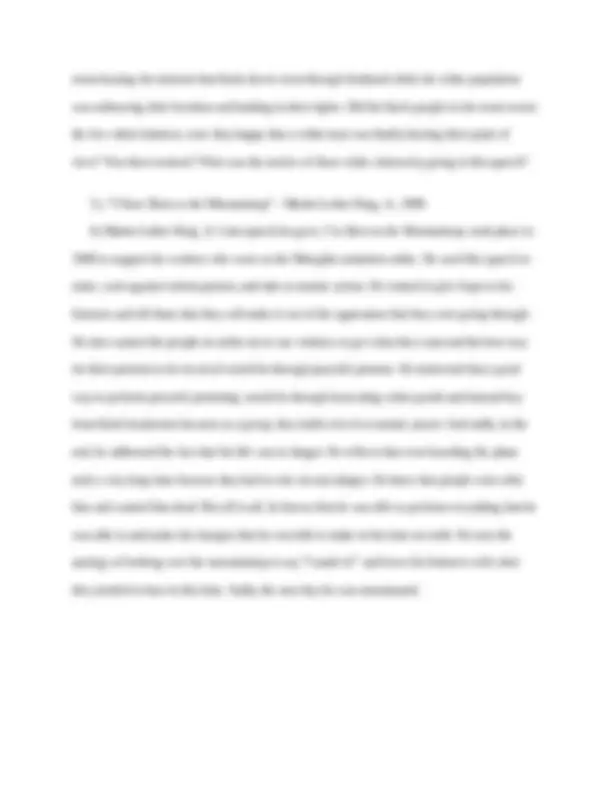



Study with the several resources on Docsity

Earn points by helping other students or get them with a premium plan


Prepare for your exams
Study with the several resources on Docsity

Earn points to download
Earn points by helping other students or get them with a premium plan
Community
Ask the community for help and clear up your study doubts
Discover the best universities in your country according to Docsity users
Free resources
Download our free guides on studying techniques, anxiety management strategies, and thesis advice from Docsity tutors
paragraphs of reading reflections'
Typology: Assignments
1 / 3

This page cannot be seen from the preview
Don't miss anything!


Nava Fedida Matthew Amyx, Ph.D HIST 103- 27 July 2023 Reading Reflection: Week 4 1.) “May I Say a Few Words?” - Sojourner Truth, 1851 Sojourner Truth’s speech for women’s rights and equality was written down in its original form by Marius Robinson in 1851 using the same accent and spelling that she used in the moment. Though she was African American and admits to not knowing how to read and write (because she was not allowed to be taught!), she still used proper American English and proved in her own words why women are equal. She used biological reasoning and biblical reasoning to get her point across. However, in Frances Gage’s version in 1863, which unfortunately became the most common version of the speech, it is recorded in the way that Gage would have imagined Sojourner to speak. This version cuts out several vowels giving it a strong Southern tone and phrases and trades the “ th ” to a “ d ” giving it an African sound. This transcription makes Sojourner Truth sound foreign and uneducated unlike the determined activist that she was in her period. It even adds words and phrases that she never even said in the original version, ironically, such as, “Ar’n’t I a woman?” which ends up being the line that the speech is known for. When someone is giving a speech, you expect them to know what they are talking about and sound like the correct person to relay the
message, but in my opinion, Gage’s version completely undoes everything that the original correct speech accomplished. 2.) “What to the Slave is the Fourth of July?” - Frederick Douglass, 1852 To Frederick Douglas and other black anti-slavery abolitionists, the 4th^ of July stood as a reminder of what a lie the promise of independence in America was. He gave this speech on July 5 th^ of 1852, to a large group of people both black and white. He notes that the promise of, “justice, liberty, prosperity and independence…” that was given to the country on Juky 4th^ was only for white people and not for slaves and people of color like himself. It is in fact, far from a day of celebration to him. He hears songs of rejoice coming from the white men, but to him all he could hear is the torture and grief of millions of African American people. For him to take part in the celebration, he would be betraying the black people in his community and he even sys it would be a betrayal of G-d. which I agree with; how could he, as a former slave step away from the suffering that they went through in order to give white men independence? From the slave’s point of view, he says that the fourth of July is a day that reminds them what a contradiction freedom is, and how cruelly they were treated in this country. How could they rejoice if the sabe trade is still going on and the Confederacy had no intention of stopping at this point in time? At the time that he gave this speech, being traded as a child still kept him up at night with the memories of the torment of being separated from his mother. I am trying to imagine what was going through the minds of the white people in the room? Were they philanthropists or activists that were trying to abolish slavery, did they own slaves in the past, did they grow up in a home that owned slaves? How was it received by them? They are sitting in this